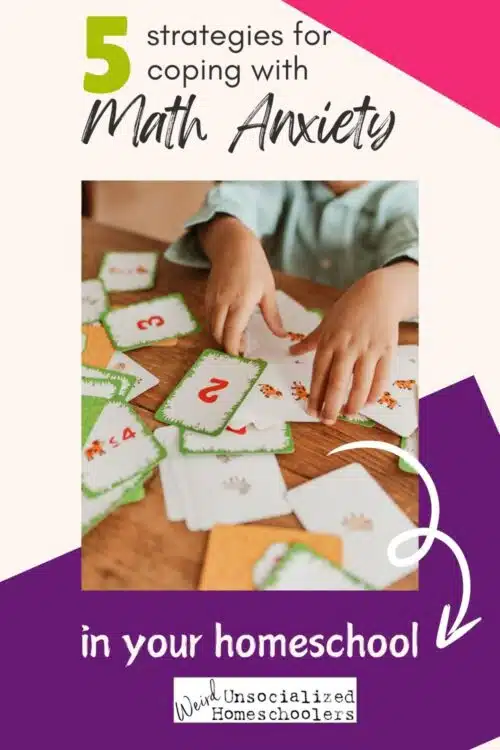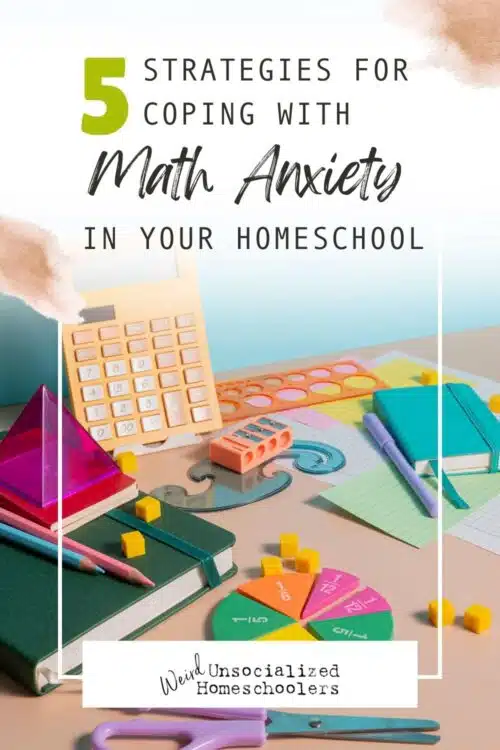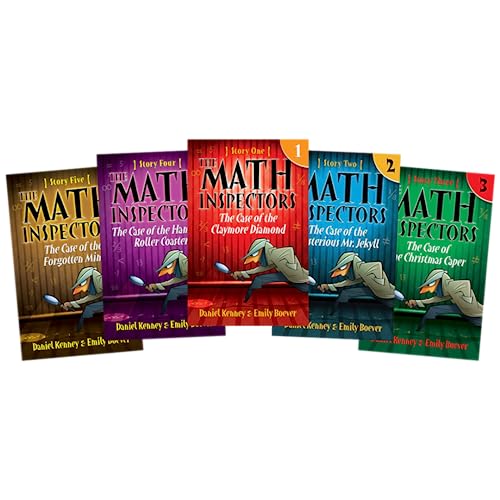5 Strategies for Coping with Math Anxiety in Your Homeschool
Math anxiety is more common than many realize, affecting about 30% of people! What is it? Pretty much exactly what it sounds like: anxiety that is related to math performance. And just like other types of anxiety, this comes with symptoms like racing thoughts, sweating, and heart palpitations.
Even worse, research indicates that math anxiety overrides working memory. This means that math anxiety can literally interfere with processes that require memorization, processes, sequencing–you know, all of the math-y things! This is a particularly big issue for children who are learning math processes for the first time because it creates a cycle of failure.
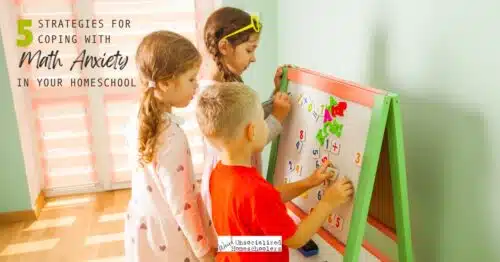
When math anxiety hinders the ability to retain and use math skills correctly, it reinforces those anxious thoughts like, “I am just bad at math,” “I’ll never be able to do this,” etc. This is a cycle we absolutely don’t want for our kids! Fortunately, there are some things we can do to combat math anxiety as homeschooling parents. Today, we’re talking about 5 strategies for coping with math anxiety in your homeschool.
Math anxiety can exist in any academic setting, but homeschooling parents have a unique opportunity to recognize its existence and to customize our child’s experience in ways that can help. This post will share some strategies that can help your student begin to break that anxious cycle when it comes to math! We want you and your young learner(s) to have peace and support when it comes to your math experience, and not let anxiety rule your homeschool!
One resource we will be mentioning throughout this post is CTCMath, an online math program that has been a wonderful asset for members of the WUH team. CTCMath lends itself well to the various coping strategies mentioned in this article! However, these tips should be useful for whatever math curriculum works best for you!
5 Tips for Coping with Math Anxiety in Your Homeschool
Discover/Address the Underlying Issue
First, assess whether your child struggles with math anxiety, and consider if this is the underlying source of their dislike of math. Instead of a separate, official disorder, math anxiety refers to classic anxiety that is associated with math. Therefore, if you’re seeing symptoms like the ones mentioned whenever it comes time to pull out the math books, you may want to consider that your child is experiencing some anxiety and address that in a more general way.
Opening lines of communication about this can be helpful for your child, and so can working on incorporating things like structured schedules and emotional regulation techniques (like deep breathing, exercise, or creative outlets). Ultimately, there are many things you can do to understand and soothe childhood anxiety, but first, it’s important to know if that is indeed the issue.
Plenty of Positive Experiences and Reinforcement
Probably the best thing you can do to break the cycle of math anxiety and negative thinking is to create as many positive experiences in math as possible! This might mean reviewing previously mastered content and praising success. (If you do this, try not to acknowledge or stress that it is from a previous grade level.)
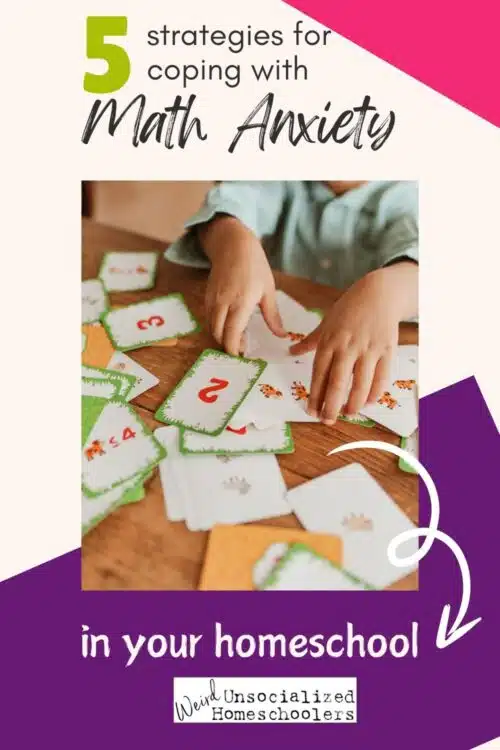
One of the things we like about CTCMath is that it allows parents to customize math lessons, even inserting review concepts from previous grades into current lessons without students being aware of it. The platform even has an option to “hide” all grade-level information from students, so that they can just focus on math.
CTCMath also provides immediate feedback after each question, which can provide instant rewards for correct answers. This feeds feelings of accomplishment that can help break the math anxiety cycle.
If you and your student work well together, you can also consider working through some math problems together (followed by plenty of modeling on your end) to help relieve some of the pressure and help math feel more collaborative. However, you decide to emphasize success, keep assignments bite-sized (another reason we like CTCMath is the short lessons!) Remember: successful experiences create more opportunities for future success, especially for students with math anxiety.
Make it Fun
This goes hand-in-hand with keeping math experiences positive! If math is a source of stress and negativity in your home, finding ways to re-frame it as “fun” can go a long way. Plenty of classic games use everyday math without making a big deal about it (think Sorry or Scrabble). You can also practice math with games like Multiplication War or an addition-based version Go Fish!
Baking, shopping, and cooking are also great ways to practice math. Try not to point out the math element before your child engages in these activities, but do highlight and praise it afterward!
There are also all kinds of learning games and apps that can give your child math practice in a way that feels more fun and bite-sized. CTCMath offers interactive lessons and games like “speed challenges” that make learning math more engaging. The platform’s gamified approach is another option to help transform math from a chore into an enjoyable activity.
If you are looking for more specific ways to bring some hands-on fun to math, we have a whole article about that, here!
Rewrite the Notion of a “Math Person”
One of the common negative thoughts that kids with math anxiety have is, “I’ll just never be a math person.” Stereotypes about what a “math person” is can really do a lot of damage, so one thing you can do is help change this narrative for your children and help them see that they, too, can be “math people!”
Learn about some people throughout history who have done great things in math (especially women, if you have girls!) Check out movies like Hidden Figures, or books like The Math Inspectors, which feature math-loving kids and adults that defy stereotypes. You can also talk about how careers such as psychology and architecture use different types of math, even though people who have those careers prefer to focus on things like helping others and creating beautiful buildings. Math is more than just numbers; we use it for all kinds of purposes!
Discuss with your child how anyone can be good at math, and how we all have unique insights and creativity to offer that can be applied to math in original ways! Anyone can be a “math person!”
Incorporate Learning Style
Lastly, we homeschool parents have the enormous advantage of being able to teach to our child’s learning style! This can help so much when it comes to reducing anxiety. Some children are visual learners, while others may prefer auditory, kinesthetic, or reading/writing methods.
One thing we love about CTCMath is that it has a multimedia approach that includes every single learning style through visual and audio explanations, interactive kinesthetic practice, worksheets and more. It gives every kind of practice to help every kind of learner, making it easy for families (especially since you can have multiple kids enrolled in the program with one membership!)
Many times, homeschool parents will already know their child’s learning style from time spent doing school together and seeing what works best. If you need help figuring out your child’s learning style, you can read this article to help uncover it!

We hope these 5 strategies help your child cope with his or her math anxiety! While anxiety may never go away completely, negative cycles can be broken with support and consistency. These strategies, and a math resource you value (like CTCMath), can give you support on your homeschool math journey and make it a better experience for everyone.
Katie Gustafson has been a member of the world of “weird, unsocialized homeschoolers” for a long time–first as an alumnus and now as a homeschooling mom to a fiercely fun little girl! She’s very into anything creative, especially writing, dancing, and painting. She’s also particularly passionate about literature and owns more books than she will probably ever be able to read. However, she reassures herself with the belief that, in the event of a digital apocalypse, she’s cultivating a much-needed physical library for future generations. Katie is happy to contribute articles to Weird Unsocialized Homeschoolers, Hip Homeschool Moms and Sparketh. She also has a personal blog on writewhereuare.com.




